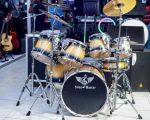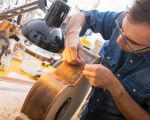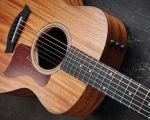How to Maintain Your Musical Instruments: Essential Tips for Longevity
As a musician, one of the most important aspects of your craft is taking care of the instruments that bring your music to life. Whether you're a guitarist, drummer, or pianist, maintaining your musical instruments is essential for their performance and longevity. Over the years, I've learned that proper care not only extends the life of an instrument but also ensures that it stays in top condition, ready to deliver its best sound every time you play. Let's explore the various ways you can keep your instruments in prime condition!
1. Regular Cleaning: The First Step to Longevity
When it comes to maintaining your musical instruments, cleaning is often the most overlooked yet most crucial step. Dust, sweat, and oils from your hands can accumulate on your instrument over time, leading to corrosion, rust, and deterioration. Cleaning your instrument regularly helps prevent these issues.
For string instruments like guitars or violins, wipe them down with a soft cloth after every practice session. This will remove sweat, oils, and dust. Be sure to clean the strings too, as accumulated grime can affect the sound quality. Don't forget the body of the instrument—use a special polish to give it a beautiful shine while also protecting the surface from scratches and damage.
2. Store Your Instruments Properly
How and where you store your instruments can make a huge difference in their overall condition. For example, guitars should be stored in a cool, dry place, away from extreme heat or humidity. Excess moisture can warp the wood, while excessive dryness can cause cracking. Using a humidity-controlled room or a specialized case can help protect your instrument from the elements.
If you play wind instruments like a saxophone or trumpet, it’s essential to properly store them in a case to prevent accidental damage. The case not only protects your instrument from bumps and scratches but also helps maintain its shape and structure.
3. Regular Tuning and String Care
Tuning your instrument regularly is an essential aspect of maintaining it. For stringed instruments like guitars, violins, and cellos, tuning is necessary not just for pitch but also for preventing unnecessary wear on the strings. Overly tight strings can snap, and loose ones may cause inconsistent sound.
Changing the strings on your instrument is another important step. Stringed instruments should have their strings replaced every few months, depending on usage. For some musicians, this might be more frequent, especially for those who play regularly or in harsh conditions. Be sure to use high-quality strings and choose the right gauge for your instrument.
4. Regularly Check for Wear and Tear
No matter how well you maintain your instrument, it's always good practice to check for any signs of wear and tear. Instruments like drums and guitars experience a lot of physical contact during performances or practice, which can lead to small cracks, dents, or other forms of damage. Keeping an eye out for these issues can help prevent them from becoming bigger problems later on.
For example, if you notice any cracks or warping on a wooden instrument, it's best to get it looked at by a professional luthier or technician. For brass and woodwind instruments, regularly check the pads and valves to ensure they aren't leaking air, which could affect the sound quality.
5. The Importance of Professional Maintenance
While regular at-home care is essential, it’s also wise to take your instrument to a professional for periodic maintenance. Instruments like pianos, violins, or horns require special knowledge to fix and tune them to their best potential. A professional can help ensure that the internal components of your instrument are in top shape and ready for performance.
For example, my own piano needed a tuning service after a year of regular use. The technician not only tuned the strings but also adjusted the internal components that affect its tonal quality. This step ensured that the piano produced clear, beautiful notes for my next concert!
6. Handling Your Instrument with Care
How you handle your instrument can also make a significant difference in its lifespan. Always make sure your hands are clean and dry before playing. Try to avoid eating or drinking around your instruments to prevent unwanted spills that could damage them. When moving or traveling with your instrument, use proper cases and protect them from impact or temperature fluctuations.
For example, I remember the first time I took my guitar on an outdoor gig. I didn’t realize how intense the sunlight could be in the summer, and I left my guitar in the backseat of the car. The extreme heat caused the wood to expand and warp, and the guitar was never quite the same. Since then, I always make sure to keep my instruments in cases, away from direct sunlight and extreme temperatures.
7. Dealing with Specific Instrument Needs
Different types of instruments come with their own set of maintenance needs. For example, brass instruments like trumpets and trombones need to be oiled regularly to ensure smooth movement of their slides and valves. Wind instruments like flutes require regular cleaning of the inner parts to prevent moisture buildup that could lead to rust or clogging.
For stringed instruments, it's important to pay attention to the bridge, which holds the strings in place. Over time, the bridge can shift or get damaged. This happened to my violin once during an intense performance, and I had to get it re-adjusted by a professional. Regular checks can help prevent such issues.
8. Invest in Quality Instrument Accessories
While caring for your instrument is paramount, investing in good-quality accessories can also make a difference in its upkeep. For example, a high-quality humidifier for a wooden instrument or a padded strap for a guitar can help protect your instrument during practice or transport.
Over the years, I’ve found that the right accessories can help protect your instrument in the long run. For instance, I bought a leather case for my guitar that not only looks great but also offers superior protection compared to the cheap soft cases I used to have.
9. Protecting Your Instrument from External Factors
Aside from cleaning and storing your instrument properly, you must also protect it from environmental factors that could cause harm. Extreme weather conditions such as humidity, heat, and cold can damage instruments in different ways.
For example, humidity can cause the wood of a guitar or violin to swell and warp, while extremely dry conditions can make the wood crack. That's why I always make sure to store my wooden instruments in a climate-controlled space to avoid such damage.








